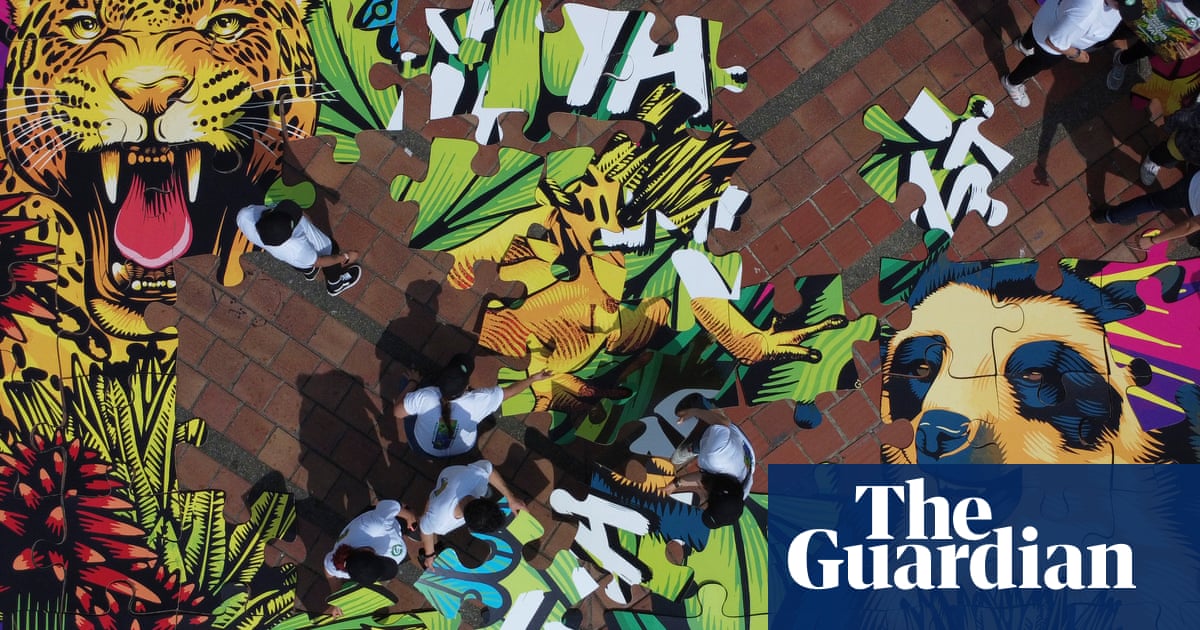In Düsseldorf in 1978, you might think Kraftwerk would be considered royalty in the local music scene. However, for a new era of kids coming up under punk at the Ratinger Hof club, the opposite was true. “They were uncool,” says Robert Görl of DAF. “You viewed yourself as the opposite of them.”
“Boring, sedate and sterile” was how his late bandmate Gabi Delgado once described the music of Kraftwerk, who were disliked so much that some took to violence against them in the club if they showed up. Kraftwerk’s Wolfgang Flür later recalled being kicked by people there multiple times, with cries of: “Let’s beat up the Kraftwerker!”
“We said that everything that had come before was shit,” Delgado said, and he didn’t just mean Kraftwerk’s pioneering electronic pop, but also the cosmic rock of Neu!, Can, Ash Ra Tempel and other German bands: “Guitars were leftovers from the old world.” Today, Görl says their original mantra was: “We don’t copy anything. Everything has to be completely new.” They were forging a new sound that was tough, muscular, sexual, and intensely physical, to be called electronic body music (EBM).
This is also the title of a new book by Yuma Hampejs and Marcel Schulze about the history of the genre. It’s a fluid style that can dip in and out of synth-pop and industrial: “Like Depeche Mode, but evil,” is how Thomas Lüdke of Invisible Limits describes it.

The genre has reverberated through the decades, setting the template for techno as well as the work of American industrial groups such as Nine Inch Nails. Contemporary DJs such as Helena Hauff and Nina Kraviz reach for its blast-furnace intensity, while another, Elena Colombi, even goes so far as to proclaim: “If you can’t dance to EBM, you’re dead inside.” In 2022 the British indie band Editors had a top 10 album that was so indebted to the genre they even named it EBM.
While initially Düsseldorf was a hotspot, boasting the likes of DAF, Die Krupps, Der Plan and Liaisons Dangereuses, Belgium’s Front 242 were also moving in this direction, as were Essex’s Nitzer Ebb. “There was no past for this kind of music,” says Jürgen Engler of Die Krupps. “That was the cool thing – there were no references, so you had to invent something that hadn’t been done before.” Front 242’s Patrick Codenys echoes this. “I viewed synthesisers as like orphans,” he says. “Because those machines had no past, unlike when you pick up a guitar and right away you can trace a path back to blues and stuff. When you work with those orphans, you’re very free to go in any direction.”
Initially DAF were a conventional band experimenting in a dark, damp basement playing with a stylophone and a very old drum kit. To raise funds for their first synth, they drove to Holland to buy hashish to resell in Düsseldorf. But soon DAF became a slimmed-down duo and by 1981 they released the classic EBM record Alles Ist Gut, featuring a shirtless and perspiring Delgado on the cover. “We always said in the 80s: we want to make you sweat and take your shirt off,” says Görl. “It was almost a homoerotic thing.” Delgado, who was bisexual, once explained the DNA of the group was simply “sex and electronics”.

Sweat dripped from every pore of these new bands. Die Krupps’ landmark single Wahre Arbeit, Wahrer Lohn would later be reworked in collaboration with Nitzer Ebb into The Machineries of Joy, which features impassioned howls about work, pain and muscle. Combined with grunts and its undeniable tops-off energy, there’s more than a whiff of sex about the track, but it’s also an ode to the working classes. “My dad was a truck driver because after the war there was a lot of rubble, so that was the way to make money,” says Engler. “I don’t remember ever hanging out with white collar guys. The physicality of labour is a big part of what we do, especially on stage.”
Live shows would often leave audiences slack-jawed or walking out. Front 242 would stomp around a smoke-engulfed stage in combat boots surrounded by camouflage nets as strobes popped with frantic intensity. “We didn’t have smoke machines, so we were throwing army-grade smoke bombs on stage,” Codenys recalls. “Sometimes the first 10 rows of the audience had to leave because they were crying from all the smoke. It was also a kind of torture for us to play through that as well. It was crazy.”
The aesthetic of some of the groups would often lean militaristic, with added black leather and short, sharp haircuts, and often caused a problem. “We were often criticised for looking like SS guys,” says Görl. “We got asked, ‘Are you Nazis?’ We laughed a lot about that shit. But we didn’t answer them. We didn’t want to excuse ourselves to them. We told them: we do what we want. So many media and radio stations avoided us. For them, it was very serious, saying: you cannot do things like this. But we just laughed and it pushed us even more to affront and be provocative.” Delgado described their aesthetic choices, as well as their lyrical references to Hitler and Mussolini, as “a demystification of fascism. We were taking these themes and putting them into a silly disco context”.
Front 242, in their matching army suits, faced similar accusations. “We’ve been called fascist,” says Codenys. “But at the same time we’ve had concerts cancelled because they thought we were extremely leftwing.” The band were attempting to embody an era rooted in fear, paranoia and violence. “We were taking samples from the news and war films and brought out music that was very threatening,” he explains. “But this was a time in the 80s when there was a real threat and as an artist you are a sponge of your time. Making this very underground, dark combat music that is threatening and provocative all links with the situation of the cold war.”
There was also a sense of finding and owning a distinct identity. “It was important that we sang in German,” says Görl. “That such progressive music was possible in the German language was a big thing for us. Up until then the Brits and Americans had a monopoly on modern music – we broke their domination.” DAF had huge success, selling hundreds of thousands of records, and remaining in the charts in Germany for almost a full year. But with that came the usual pitfalls and after 1982’s Für Immer, they split up for a few years. Delgado later recalled this period: “We were stinking rich. We only ever flew first class, bought only Armani clothing, and stayed in the most expensive hotels. Cocaine as if there was no tomorrow.” Görl laughs about it all today. “We split up just at the point the record company had really big plans for us to be even more successful,” he says. “They were like, ‘are you mad?’ But this is how Gabi and I were.”
The music continued to gather momentum throughout the 80s, though. Görl recalls going on a much-needed break to Thailand and within 30 minutes of entering a nightclub in Bangkok he was hearing his own music. As techno mushroomed – along with the even harder Belgian new beat movement that followed – EBM proved to be a perfect genre to mix in with it all. “You couldn’t miss it,” says Engler. “Every club was playing it at the time.” It began to shape a new generation of DJs and producers, with the late Andrew Weatherall once recalling that hearing Nitzer Ebb’s thumping Join in the Chant in a club was the closest he ever felt to God.
Countless EBM new bands exist today – Chrome Corpse, the Juggernauts and Visitor – and many of the originals still tour. But there is a feeling of a closing chapter for some of the original pioneers. Front 242 have retired from performing and just played their final shows, while Görl admits the old DAF died along with Delgado in 2020, even though he still has future plans for a new iteration. But he feels that their original mantra was a success that still lives on. “We created something that sounded like nothing, or nobody, else,” Görl says. “Something truly original.”

 2 months ago
35
2 months ago
35













































